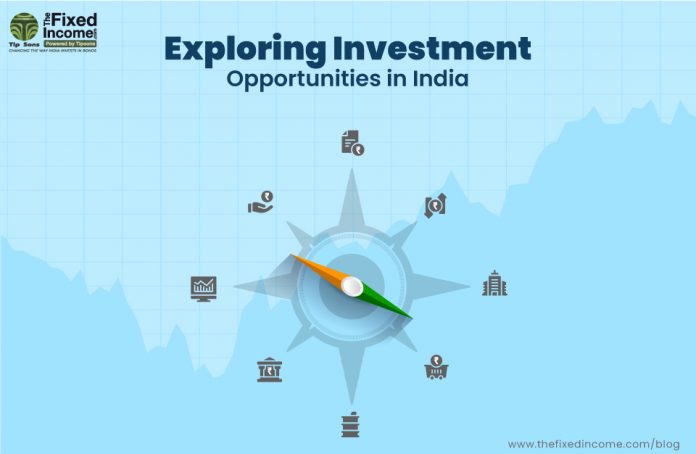As we step into the new financial year, investors are on the lookout for the best places to invest their money. Despite the global economic turbulence, India has emerged as a shining star. According to the Bloomberg report on recession probabilities worldwide in 2023, India is predicted to have zero chances of recession, making it an attractive destination for investment.
In this blog, we aim to explore the diverse investment opportunities available in India in 2023 that will guide you toward making informed investment decisions. For ease of understanding, we have divided this guide into three sections: Debt, Equity, and Real Estate, each highlighting different avenues for investment.
Debt: If you’re looking to protect your wealth or invest to earn fixed returns, investing in bonds can be a good option. Bonds offer fixed interest rates and long-term investment returns, making them a reliable investment choice.
Government Bonds:
Government securities are securities issued by the Government of India. The short-term securities that have maturity within a year are known as treasury bills whereas securities issued for longer periods are known as dated securities or Government bonds. These are issued by both the Central as well State Governments.
Treasury Bills: Treasury bills are short-term investments. T-bills are issued of three tenors- 91 Days, 182 Days and 364 Days and can be purchased for minimum amounts of Rs.10,000 and multiples thereon as specified by RBI from time to time.
T-bills are zero-interest securities i.e T-Bills are issued at a discount and redeemed at par/ face value. The difference between the maturity amount and the issue price is the interest income for the investors. Individual investors can place bids as per the non-competitive scheme through the Retail Direct portal.
Government security or G-sec, are dated securities issued by the Government of India (GOI). These bonds pay a semi-annual coupon rate and come with a maturity period ranging from one year to 30 years- and you can invest at any time during this period. As the Government of India issues the same, there is almost negligible risk of default therefore it is also known as Risk Free Gilt Edged Instruments.
Gold Bonds:
In recent years, the popularity of gold bonds has emerged significantly as gold bonds are a great way to protect your wealth. Gold Bonds are issued by the RBI on behalf of the Government of India. Gold Bonds are government securities denominated in grams of gold i.e. 1 Bond is equivalent to 1 Gram of Gold.
It offers a fixed rate of interest of 2.5% per annum payable semi-annually in addition to capital appreciation. It eliminates the costs of storage, making charges, etc, and helps to reduce the overall costs by storing it in digital mode.
Sovereign Gold Bonds have a predetermined tenure of 8 Years, which means that they will mature at the end of their term. However, premature redemption of gold bonds may be permitted after the 5th year.
Fixed Deposits:
Fixed Deposits have a long-standing history as investment instruments in India. The investors deposit their money for a fixed period of time with the banks in exchange for pre-determined returns. These instruments are considered stable and low-risk investment options as they are issued by the banks. Additionally, fixed deposits also offer flexibility in terms of investment tenure, allowing investors to choose a period that aligns with their financial goals and liquidity needs. It is thus well suited for investors who are risk averse. However, due to low risk, the returns generated are also quite low as compared to other asset classes.
Municipal Bonds:
Municipal Bonds are issued by the local authorities and municipalities for their various socio-economic development through building bridges, schools, hospitals, providing proper amenities to households, etc for the city. The Government is also incentivizing the municipalities for improving their creditworthiness and tapping the capital market for their various needs.
The funds raised through this can be used for infrastructure projects such as roads, railways, ports etc., which will help improve the country’s economic growth rate in future years. Indore Municipality has already raised capital this year by issuing green bonds and as per reports Surat and Visakhapatnam are likely to issue municipal bonds in the near future.
Debt Funds:
Debt funds are mutual fund schemes wherein a majority of the funds are invested in debt like government bonds, corporate bonds, and money market instruments etc. Debt funds provide regular fixed reliable returns and are fairly liquid instruments. However, it is pertinent to note that due to the recent changes in the taxation provision the debt funds will now be taxed under short-term capital head regardless of the holding period.
Equity:
Investors who are risk-takers invest directly in equity markets. The shares of the companies are listed here which can be traded by the investors. It is also known as the stock market or stock exchange. However, the equity market is prone to volatility therefore one should undertake the requisite research and fundamental analysis of the companies before investing in shares of any company.
Investing in the stock market will give you a higher return than other forms of investment like bonds or gold because it offers a high risk-return ratio.
Equity Mutual Funds:
Equity mutual funds are investment vehicles that pool money from multiple investors to invest primarily in stocks or equities of various companies. These funds are managed by experienced fund managers who act on behalf of the investors, making informed investment decisions.
Exchange Traded Funds:
ETFs are a pool of securities or investment funds that are traded on stock exchanges. They offer investors exposure to a diversified portfolio of assets without the need for individually purchasing and managing each security.
Real Estate:
Real estate has long been considered a promising investment option for investors. The real estate market offers a variety of investment opportunities, including residential properties, commercial buildings, etc. One of the key advantages of investing in real estate is its potential for both long-term appreciation and regular income generation.
Real Estate Investment Trusts (REITs):
REITs are companies that own, operate or finance income-generating real estate properties. They provide investors with an opportunity to access the real estate market without directly owning physical properties.
Investing in REITs offers potential benefits like a consistent income stream. As per the law, REITs are required to distribute a significant portion of their taxable income to shareholders as dividends. This characteristic makes REITs particularly attractive to investors seeking consistent cash flow. Currently, three REITs that are listed in India:
- Brookfield India
- Embassy Office
- Mindspace Business
Conclusion
India is a country that continues to grow at an impressive pace. The government has made efforts in recent years to promote different sectors of the economy. These changes have led to an increase in the demand for financial products like bonds and debt funds among citizens who wish to invest their money safely or simply make sure they can access their funds when needed. It is always said to diversify your portfolio into areas like equity, bonds, gold, real estate, etc. for an ideal portfolio and earn overall good returns.
We hope this article was helpful for you, and that it helped you decide where to invest money in India in 2023. If you have any questions or comments please reach out and let us know!























